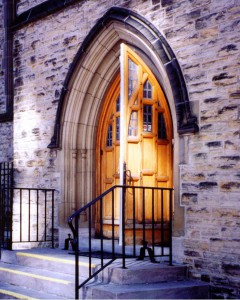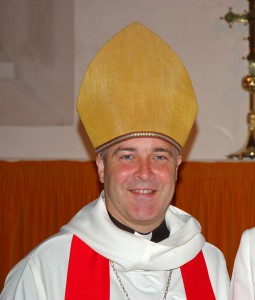
We asked Dave Male:
How soon do we start public worship…
[youtube]vudEgzr5PIo[/youtube]Length: 1 minute, 37 seconds
Watch for a new question posted each week, or view the entire interview here.
Every Church an Evangelizing Community!
by Ryan Sim.

We asked Dave Male:
How soon do we start public worship…
[youtube]vudEgzr5PIo[/youtube]Length: 1 minute, 37 seconds
Watch for a new question posted each week, or view the entire interview here.
by Sue Kalbfleisch.
Are you looking for a way to reach families who are not in our churches on Sundays?

A ‘Messy Fiesta’ is a full day workshop to experience and learn about Messy Church.
Messy Church aims to create the opportunity for adults and children to enjoy expressing their creativity, sit down together to eat a meal, experience worship and have fun within a church context.
You will have an opportunity to experience what Messy Church can offer your church. The session will allow you to experience a MC, brainstorm your own MC, gather resources, and explore the history of this innovative way of being Church in a changing world. You will take away knowledge, skills and materials to help you get started.
Presenters: Rev. Nancy Rowe (MC Practitioner for 5 years) and Sue & Andy Kalbfleisch (MC Regional Coordinators)
Information and Registration Flyer
To find out more about Messy Church, visit the website where it all started at www.messychurch.org.uk Look for the video!
by Sue Kalbfleisch.
Are you looking for a way to reach families who are not in our churches on Sundays? 
A ‘Messy Fiesta’ is a full day workshop to experience and learn about Messy Church.
Messy Church aims to create the opportunity for adults and children to enjoy expressing their creativity, sit down together to eat a meal, experience worship and have fun within a church context.
You will have an opportunity to experience what Messy Church can offer your church. The session will allow you to experience a MC, brainstorm your own MC, gather resources, and explore the history of this innovative way of being Church in a changing world.
Presenters: Rev. Nancy Rowe (MC Practitioner for 5 years) & Sue Kalbfleisch (MC Regional Coordinator)
For more information, download the Toronto Messy Fiesta Flyer
Register for the Messy Fiesta and/or the More than Franchises conference (June 16-18) online at www.morefranchises.ca
Can’t attend? Nancy and Sue are presenting a MC workshop Saturday, June 16 from 2-3:30 as part of the More than Franchises: A Fresh Brew conference.
by Sue Kalbfleisch.
 Are you looking for a way to reach families who are not in our churches on Sundays?
Are you looking for a way to reach families who are not in our churches on Sundays?
A ‘Messy Fiesta’ is a Saturday workshop to experience and learn about Messy Church.
Messy Church aims to create the opportunity for adults and children to enjoy expressing their creativity, sit down together to eat a meal, experience worship and have fun within a church context.
Reach out to children & young families in your community through Messy Church. This event is both for people who are new to Messy Church and for those who’ve already started up Messy Churches. Connect with others, share ideas and figure out what’s next when you join us for a great day of fun, learning & networking.
To find out more about Messy Church, visit the website where it all started and check out the video at http://www.messychurch.org.uk
Join us at Christ the King – Dietrich Bonhoeffer Lutheran Church in Thornhill ON
on Saturday Feb. 18th from 10 to 3, doors open at 9:30. Cost is $25.00 each (includes lunch).
Presenters: Rev. Nancy Rowe (MC Practitioner for over 4 years) & Sue Kalbfleisch (MC Regional Coordinator)
by Barry Parker.
The days of the neighbourhood dropping in for Church just because it’s Christmas are over. Here’s how your church can move into the neighbourhood instead.
For centuries, the Advent/Christmas seasons have been a time for folks to automatically come into Church, perhaps for the only time in a year. However, in this post-Christendom, and some would argue post-Christian age, all bets are off. The days of expectation that people will naturally come into events in our churches simply because it is Christmas, are rapidly dwindling. This is not an urban, suburban, or rural issue. This is not a church size or denominational issue. This is the new normal of every local church in our increasingly secularized age.
the only time in a year. However, in this post-Christendom, and some would argue post-Christian age, all bets are off. The days of expectation that people will naturally come into events in our churches simply because it is Christmas, are rapidly dwindling. This is not an urban, suburban, or rural issue. This is not a church size or denominational issue. This is the new normal of every local church in our increasingly secularized age.
It is not a time for despair. In fact, it is an exciting season of opportunity and hope for those in Christian leadership who are willing to fully engage the challenges of our day. In Eugene Peterson’s paraphrase of the magisterial Prologue in John’s gospel that is read every Christmas, we get a glimpse into the missional heart of the Incarnation:
The Word became flesh and blood, and moved into the neighborhood. We saw the glory with our own eyes, the one-of-a-kind glory, like Father, like Son, generous inside and out, true from start to finish. (Jn. 1:14, The Message by Eugene Peterson)
God moves into our neighbourhood. We have an opportunity to step back and re-think all we intend, practice and believe about our engagement with Advent/Christmas and with our culture. In whatever way your Church makes decisions, I am going to suggest that we gather, and consider six fundamentals of Advent/Christmas planning, before we look at some practical applications.
Ditch the complaining about the hyper-consumerism of our culture or the lack of religious practice in our society. We follow the One who not only is the Word made flesh, but also the One who breaks the back of death, evil and our sin by his atoning work on the Cross. Our world needs the good news of the Gospel as we share our hope that is grounded in the birth, death and resurrection of Jesus Christ — the Gospel imperative.
Who needs to be part of this conversation? How can the conversation be expanded to include those not typically in the decision-making process? Engage those who only come at Christmas. Talk to those in your community who do not attend at all. Ask your youth and young adults about their expectations and experiences of what the Church can be and do at Christmastide.
Consider every aspect of your Advent and Christmas practices. Ask yourself the simple but exceptionally difficult question—why? Why do we do what we do during Advent and Christmas? Are these events aligned with the gospel imperatives of the Incarnation?
Consider what it will mean to engage your community this Christmas, versus expecting your community to engage your church events.
Think through when your Advent and Christmas events are held. Are attendance patterns changing? Do we need to change our event times to engage more people more effectively?
Where is the best expression of the Advent and Christmas season? Would it be more beneficial to change locales, to actually ‘move into the neighbourhood’ instead of offering events at our local church building?
These six elements of re-thinking and re-framing our understanding and practices of Advent/Christmas in our churches is the hard work of Christian leadership. You will find very quickly that “Good ideas are not adopted automatically. They must be driven into practice with courageous patience.” (Hyman Rickover)
Historic methodologies and practices feel good to us, but do they connect the Gospel and our culture? If we have done our homework, and prayerfully thought through these six fundamentals, then we might be surprised by the need for the church’s historic gospel tradition, versus our own local traditionalism. In the context of your local community, remember theologian Jaroslav Pelikan’s famous dictum: “Traditionalism is the dead religion of the living. Tradition is the living religion of the dead.”
At St. Paul’s, as we have sought to consider these Advent/Christmas planning fundamentals, we have discovered some simple and effective things to engage and connect with the communities we serve. We are a work in progress, always trying to pray and think through what, why and how we are doing and being the Church.
Here are some things to think about for the Advent/Christmas seasons:
Advertise early and widely with the message that you want to engage with your community, not simply get them into church at this time of year.
Use social media to get the message out. Even if you have no experience or are personally wary – seek out those who regularly use Facebook or Twitter and learn. The cost of your usual advertising -—newspaper, flyers etc. – is increasing while their effectiveness is diminishing.
Undertake a prayer ministry to pray for your visitors, for your events, for gospel proclamation.
Ensure one clear theme in the music, preaching, and prayers so that your message is coherent, concise and consistent.
Through the Advent/Christmas seasons, place the incarnation in the context of the whole of salvation history. For example, a traditional Lessons and Carols service embodies the great sweep of Creation, Rebellion, Israel, Jesus, Still Being Written and The End.
In preaching, beware of the urge to bury people in scriptural volume. Do not overestimate the biblical literacy of our culture or our church communities. Just because you know the implications of the incarnation, do not assume everyone does.
Beware of the urge to find new meaning in the old text. Allow the Gospel and the text to shape your preaching.
But do preach! Please do not offer a Christmas devotional or read someone else’ thoughts. This is a prime opportunity for you to connect the biblical story with your community in an authentic and meaningful way.
Offer an evangelistic, relationship-based program that people can sign up for immediately, on the spot that will begin right after Christmas. Use Alpha or Christianity Explored. We use Christianity 101 (C101), which for us starts first thing in the New Year.
Put your best foot forward with preaching, liturgy, music, and hospitality. Think of the famous title of Oswald Chamber’s daily devotional book—My Utmost for His Highest. To offer your best to the Lord Jesus is to do just that, offer your best. Whether we like it or not, people are used to high quality production values and they expect your practice to be aligned with our message that the Gospel is the most important good news in the world.
Consider giving your visitors a small and inexpensive gift that explains Christmas, such as Nicky Gumbel’s “Why Christmas?”
Work to reframe your understanding of Advent as much more than a liturgical season. Be a community that truly seeks to reshape yourselves and society’s worldview from one of consumption to one of compassion. The Advent Conspiracy (adventconspiracy.org) is a brilliant resource to highlight, particularly at this time of year, that you are blessed solely to be a blessing to others.
Offer opportunities to serve at Christmastide. Perhaps you might offer a Christmas dinner to those who are alone at this time of year. You might encourage everyone in your church to offer one hour to your local food bank or one hour to visit a nursing home. Even the smallest churches will have an impact. To engage your community means to serve your community in some capacity, particularly at this time of year.
this time of year. You might encourage everyone in your church to offer one hour to your local food bank or one hour to visit a nursing home. Even the smallest churches will have an impact. To engage your community means to serve your community in some capacity, particularly at this time of year.
Throw a party. If you have a children’s or family service, build a festive venue with cupcakes and balloons. Visitors and their children relate to a birthday party for Jesus. For your Christmas services, provide opportunities to build relationships (not just a coffee hour), where your faith community can genuinely engage the community by not only serving, but also simply having fun.
We live in a changing world and this time of year can be a season of challenge and over-extension. With Advent and Christmas—we have been given an opportunity to connect with our world. As Christopher Wright wrote in The Mission of God:
It is not so much the case that God has a mission for his church in the world, as that God has a church for his mission in the world. Mission was not made for the church; the church was made for mission—God’s mission.
As church, we are made for such a time as this. We are made for God’s mission, which is to proclaim in word and deed the reality that “the Word became flesh and blood and moved into the neighbourhood.
Barry Parker is rector of St.Paul’s Anglican Church, Bloor St., Toronto. Check out their website —and how St.Paul’s is presenting Christmas to their community— at www.stpaulsbloor.org
by Ryan Sim.

This is a workshop given by Bishop Stephen Cottrell, and facilitated by Father David Harrison, at the Vital Church Planting Conference 2011.
Length: 1 hour
[podcast]http://institute.wycliffecollege.ca/resources/Fresh Expressions in the Sacramental Tradition Bishop Stephen Cottrell.mp3[/podcast]
Subscribe to all our Podcasts here
Open post to play audio recording
by Sue Kalbfleisch.
Are you looking for a way to reach families who are not in our churches on Sundays? 
A ‘Messy Fiesta’ is a Saturday workshop to experience and learn about Messy Church.
Messy Church aims to create the opportunity for adults and children to enjoy expressing their creativity, sit down together to eat a meal, experience worship and have fun within a church context.
Reach out to children & young families in your community through Messy Church. This event is both for people who are new to Messy Church and for those who’ve already started up Messy Churches. Connect with others, share ideas and figure out what’s next when you join us for a great day of fun, learning & networking. Cost is $20.00 each (includes lunch). Bring a team of 3 or more for $15.00 each.
To find out more about Messy Church, visit the website where it all started and check out the video at www.messychurch.org.uk
Presenters: Rev. Nancy Rowe (MC Practitioner for 4 years) & Sue Kalbfleisch (MC Regional Coordinator)
by John Bowen.
 I don’t know if you have ever had the experience of knowing what you should have said — only when the opportunity to say it has long past. It seems to happen to me frequently — and perhaps more often as I get older. On this occasion it was during lunch. My friend and I were talking about the need (as I saw it) for churches to be missional, and what that might mean. Then, my friend waved his fork in my general direction and said, “Of course, you need to remember that some of us are more liturgical than missional.” I instinctively felt there was something wrong with that way of putting things. But on the spur of the moment I couldn’t put my finger on it, and the conversation moved on to other things. My friend paid for lunch, and we went our separate ways.
I don’t know if you have ever had the experience of knowing what you should have said — only when the opportunity to say it has long past. It seems to happen to me frequently — and perhaps more often as I get older. On this occasion it was during lunch. My friend and I were talking about the need (as I saw it) for churches to be missional, and what that might mean. Then, my friend waved his fork in my general direction and said, “Of course, you need to remember that some of us are more liturgical than missional.” I instinctively felt there was something wrong with that way of putting things. But on the spur of the moment I couldn’t put my finger on it, and the conversation moved on to other things. My friend paid for lunch, and we went our separate ways.
That evening, his comment came back to me: “More liturgical than missional.” I’d heard that kind of comment before, but the distinction had never been put quite so baldly. Why did it bother me so much? The answer came that Sunday, during Eucharistic Prayer #4 in the Book of Alternative Services, sometimes called the “Star Wars” prayer because of its reference to “the vast expanse of interstellar space, galaxies, suns, the planets in their courses, and this fragile earth, our island home.” Personally I love it, perhaps because it puts the Christian story in such a vast and beautiful context: it is (literally) awesome.
 Then comes the reminder of what went wrong in our universe: “We turn against you, and betray your trust, and we turn against one another.” It is our failure to love God and neighbour. And then the comforting words, “Again and again you call us to return.” Thank God, God does not give up on us. “Through the prophets and sages you reveal your righteous law.” God’s rescue began almost as soon as sin entered our world. But then, “In the fullness of time you sent your Son, born of a woman, to be our Saviour.” Jesus, the climax of God’s mission to our world.
Then comes the reminder of what went wrong in our universe: “We turn against you, and betray your trust, and we turn against one another.” It is our failure to love God and neighbour. And then the comforting words, “Again and again you call us to return.” Thank God, God does not give up on us. “Through the prophets and sages you reveal your righteous law.” God’s rescue began almost as soon as sin entered our world. But then, “In the fullness of time you sent your Son, born of a woman, to be our Saviour.” Jesus, the climax of God’s mission to our world.
What was that word? “Mission!” The fancy term theologians use for it is the missio dei — the mission of God to redeem our sinful and hurting world. And there it was at the heart of the Eucharist!
I quickly flipped through the other prayers of consecration. There it was again:
When we turned away from you in sin, you did not cease to care for us, but opened a path of salvation for all people. (#1)
Jesus . . . lived and died as one of us, to reconcile us to you, the God and Father of all (#2)
[I]n these last days you sent [Jesus your Son] to be incarnate from the Virgin Mary, to be the Saviour and redeemer of the world (#3)
In Jesus, your Son, you bring healing to our world and gather us into one great family. (#5)
In your mercy you came to our help, so that in seeking you we might find you. Again and again you called us into covenant with you . . . (#6)
At the heart of every one of the prayers of consecration is the same simple message, though phrased in different ways: God in love reaches out to a sinful and hurting world, and as the culmination of that reaching out sends Jesus into the world to redeem humankind. The verbs are revealing: send, give up, open, bring, come, call, reconcile. They are words of movement, change and hope —words of mission.
The Christian God, these prayers remind us, is a missionary. They never tire of telling the story of what this missionary God has done in sending Jesus. Today’s emphasis on “being missional” is not just the latest flavor of the religious month. It is reminder of that mission which begins in the heart of God and which swoops down to redeem a rebellious world. And the Eucharistic liturgy, it seems, is first and foremost a celebration of mission. That’s why we can’t separate the two quite as easily as my friend wished.
But then a second thing hit me: the Church where we celebrate the mission of God in the Eucharist would not exist, were it not for that mission. The story of God’s mission, which we retell at every Eucharist, is not the story of some far-off reality or an alien people; neither is it an abstract theory for theologians to argue over. The story of God’s mission is the story of every church, however remote or ageing or small, where the celebration takes place. The only reason any church exists is because it is the fruit of God’s reaching out in Jesus Christ. This is why the prayers are full of “we,” “us” and “our.” If there had been no missio dei, there would be no Church. If there were no missionary God, there would be no Eucharist. The very word Eucharist — thanksgiving — is precisely because God has reached out to save us. This is the story — the only story — which constitutes the Church and its worship. It is most truly, for the Church, “the greatest story ever told.” This is why it comes at the climax of Christianity’s most distinctive act of worship.
This means that liturgy is in one way centripetal: it is the sacrament which speaks of God’s mission to “to gather us into one great family” at the cross and at the table. God reaches out his hands to us in mission: we are drawn to respond in repentance, faith and thanksgiving.
But this is not the end. Liturgy is also centrifugal. As the Eucharist came to an end, it became clear. We say together:
Gracious God, we thank you for feeding us with the body and blood of your Son Jesus Christ. May we, who share his body, live his risen life; we, who drink his cup, bring life to others; we, whom the Spirit lights, give light to the world.
If worshippers are mysteriously united with Jesus in the bread and wine, there are practical consequences to that unity. If we are one with Christ, we are one with him in his work in the world. And what is that work? To “live his risen life,” “to bring life to others,” and to “give light to the world”: not a bad summary of Christ’s missionary work —which he now shares with those who have eaten and drunk at his table.
The Eucharist is not an escape from the wicked world. It is a drawing apart from the world for a time, in order to be sacramentally reminded that “God so loved the world”— and then sent us out to serve God there.
The downward swoop of God’s grace catches us up into its onward flow. John Stott has said: “People need two conversions: one from the world to Christ, and the other with Christ into the world.” And at the hinge between those two movements stands the Eucharist, to which we are drawn by the mission of God, and from which we are sent for the mission of God.
Liturgy without mission is like the Dead Sea. Rivers run into it, but there is no outlet. No life can survive in it. Mission without liturgy is like a flash flood, powerful but quickly over, not fed by permanent springs — and equally unable to sustain life.
Liturgy and mission together, however, are symbiotic, as God intended, life-giving first to the people of God, and then through them in the power of the Spirit to the world.
I think I need to call my friend and schedule another lunch. This time it will be my turn to pay.